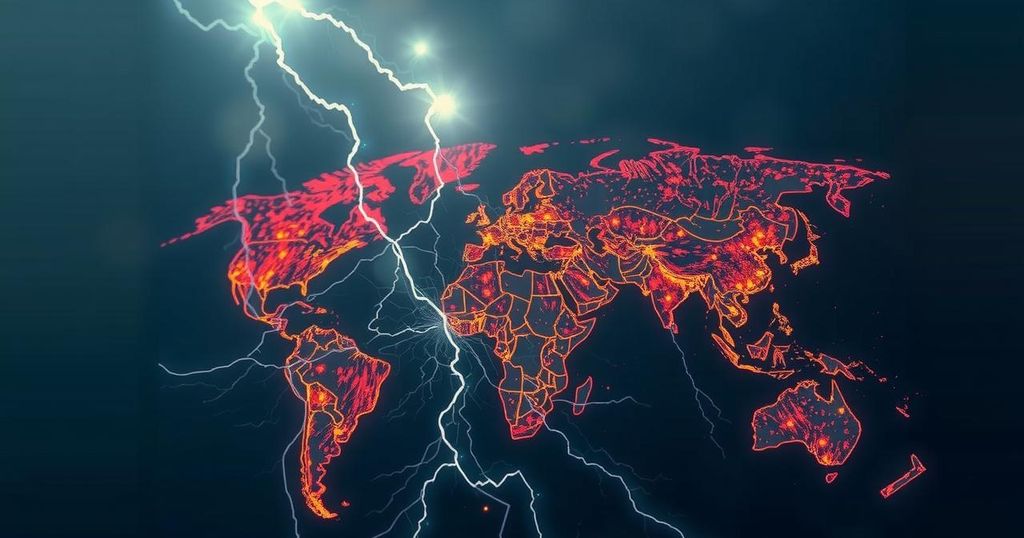A recent analysis indicates that human-caused climate change has intensified the ten deadliest extreme weather events in the last 20 years, resulting in over 570,000 deaths. This includes catastrophic heatwaves and droughts across various continents, with a significant need for political action on climate resilience.
A recent analysis conducted by the World Weather Attribution (WWA) group at Imperial College London reveals that human-induced climate change has intensified the ten deadliest extreme weather events of the past two decades. These catastrophic occurrences, which include storms, heatwaves, and floods, have tragically resulted in over 570,000 fatalities across Europe, Africa, and Asia. Dr. Friederike Otto, co-founder of WWA, stated that this research should serve as a wake-up call for political leaders who remain reliant on fossil fuels, emphasizing that continued reliance on oil, gas, and coal will perpetuate human suffering. The research examined data from the most lethal weather events recorded in the International Disaster Database since 2004, the year when the first study definitively linked climate change to extreme weather. Among these, the drought in Somalia (2011) was the deadliest, resulting in an estimated 250,000 deaths, which increased in likelihood and severity due to climate change. Notably, the heatwave in France (2015), which claimed more than 3,000 lives, was made twice as likely by climate impacts. In more recent years, the European heatwaves of 2022 and 2023 significantly contributed to the death toll, claiming 53,000 and 37,000 lives, respectively, with the latter deemed impossible without the influence of climate change. The study also established that major tropical cyclones which struck Bangladesh in 2007, Myanmar in 2008, and the Philippines in 2013 were exacerbated by climate change, as were the floods in India (2013). Further, the researchers caution that the actual death toll may be underestimated, particularly in regions where health impacts from extreme heat are inadequately recorded, notably in developing countries. The groundbreaking research methodology employed by Dr. Otto and her team contrasted contemporary weather patterns against simulations that excluded the effects of anthropogenic greenhouse gas emissions, thereby linking individual weather events to rising global temperatures. Dr. Otto and Geert Jan van Oldenborgh, the co-founders of WWA, developed this approach, utilizing atmospheric models to assess the likelihood of extreme weather occurrences in both a warmed world and a pre-industrial context. This comprehensive analysis revealed the heightened likelihood of such events due to the estimated 1.2°C increase in global temperatures since the onset of the industrial revolution. Roop Singh from the Red Cross Red Crescent Climate Centre remarked on the urgent need for global resilience against climate change, warning that continued warming will lead to increasingly frequent and severe weather events. The study created a compelling case for urgent action to mitigate climate change and adapt to its inevitable impacts, underscoring the dire consequences of inaction.
Recent scientific endeavors have increasingly illustrated the deleterious effects of human-caused climate change on extreme weather events. The World Weather Attribution (WWA) group, comprising leading climatologists, has dedicated substantial efforts to quantifying the relationship between climate change and the frequency and intensity of extreme weather occurrences. Their innovative methodologies permit the discernment of climatic influences on specific catastrophic events, thereby providing a clearer understanding of the ramifications of global warming on human life. This ongoing research plays a critical role in informing policymakers and the public about the necessity for immediate action to address the escalating climate crisis, fostering a dialogue on sustainable practices and energy consumption.
In conclusion, the research conducted by the World Weather Attribution group reveals a dire association between human-induced climate change and the exacerbation of extreme weather events. The statistical evidence linking increased mortality from catastrophic events to climatic changes should catalyze urgent actions from global leaders to mitigate fossil fuel reliance and enhance resilience to climate impacts. The study highlights the profound need for preparation against future climate scenarios, emphasizing that every increment of global temperature rise will invariably lead to increased extreme weather events and loss of lives.
Original Source: www.bbc.co.uk






